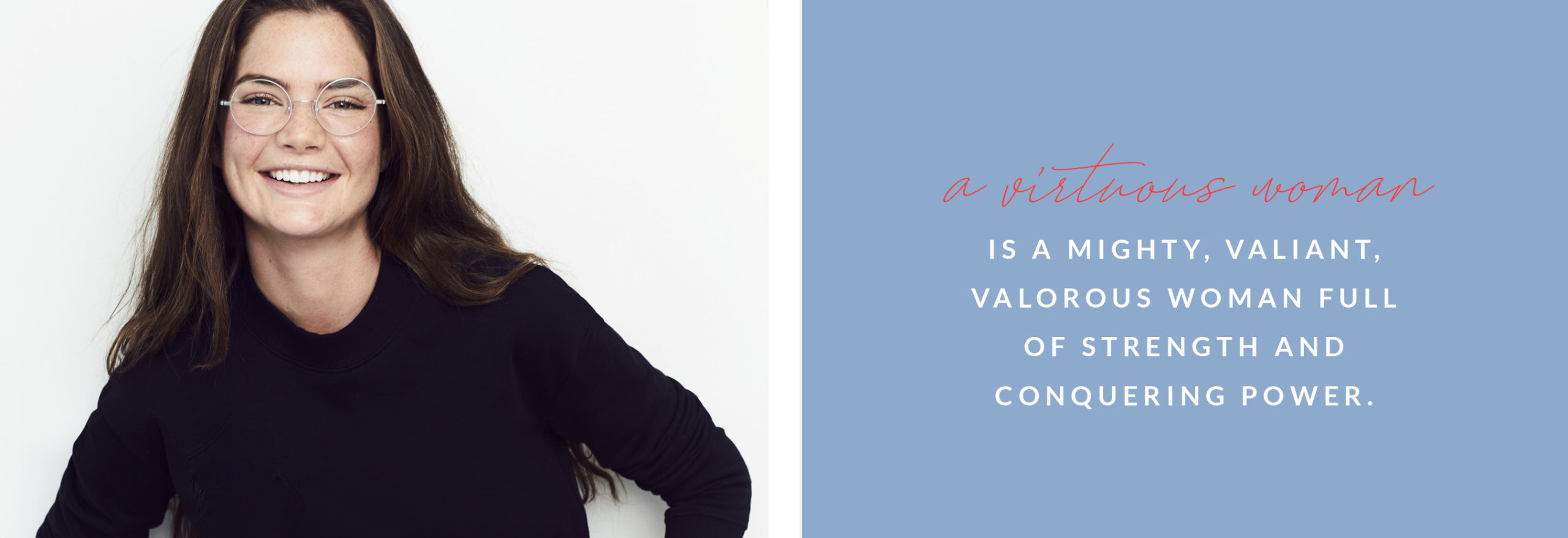Embracing Your Calling & Purpose as a Woman
by LESLIE LUDY

The tea room was warm, cozy, and inviting. It was situated in the heart of a quaint downtown shopping area, surrounded by specialty stores that sparkled with holiday lights. My three young daughters and I, along with my mom, took our places at a private table and prepared to enjoy afternoon tea, complete with porcelain teacups and dainty finger foods. This had become one of our pre-Christmas traditions — to get dressed up and go out for a “ladies’ tea party.”
Everything about the tea room was lovely and charmingly old-fashioned. Except for one thing. When our server came to the table, dressed in a long feminine skirt, frilly blouse, and gingham apron, we had to try hard not to stare. He was a man — dressed in fancy female clothing, hair in a girly bun, make-up covering his face, pouring tea into delicate flowered teacups and speaking in a high-pitched voice. No, he wasn’t trying to be funny. He was trying to be a woman.
As soon as he left our table my girls began peppering me with questions. Why was that boy dressed like a girl? Why was he acting like a lady instead of a man? Was he doing it for a joke or was he serious? I told them as discreetly as possible that we would need to talk about it later. I felt a deep sadness as I observed this man who was desperately searching in vain for his true identity.
In the car on the drive home, I had the challenging job of trying to explain to my little girls what they had seen in the tea room. I am sure I didn’t do a perfect job of articulating to my children the reality of gender confusion. The clearest way I could explain it was with this one simple statement: Some people in our world today are confused about who they really are. Sometimes men think they should be women, so that’s what they try to be. And sometimes women think they should be men, so that’s what they try to be.
As the girls processed this, my mom observed that when my brothers and I were young, she never would have been put in the position to have to answer those kinds of questions. It was a sharp reminder of how rapidly the culture has gone in the direction of redefining God’s design for “male” and “female.”
It’s easy to feel helpless and frustrated as we watch the sexual identity chaos swirling around us. But far more important than trying to address the issue from a political or social perspective, we must address it within our own souls. Instead of pointing the finger at those around us, let’s begin with ourselves. In such a time as this, each of us must prayerfully grapple with this question: Am I willing to wholeheartedly embrace God’s design for me as a woman?
It’s interesting how that simple question can trigger negative emotions within many of us. The “role of a woman” can be a very sensitive topic, not just culturally but on a personal level as well. Whether we have been hurt by abusive men or smothered by oppressive ideas of what a woman’s life should look like, many of us have lost sight of God’s vision for womanhood. We often associate “being a woman” with being belittled, controlled, rejected, or worse.
But when we clear away the blur of humanly contrived versions of womanhood and take an unhindered look at God’s design for femininity — it is truly a beautiful sight to behold.
So, together, let’s clear away the fog and begin to catch a vision for womanhood as God intended it to be.
Clearing the Fog
The topic of womanhood is vast, but in this article I’d like to start by addressing two of the most common cultural myths about our identity as women and replace them with the amazing reality of God’s design. You may or may not be personally struggling with these myths, but chances are you know (or will soon encounter) a woman who is. And it is critical to know God’s heart on these matters. Regardless of the intensity of the struggle or confusion, there is one fact we can bank on: God’s truth sets free. So let’s tackle these myths head on and replace cultural lies with the power of His truth.
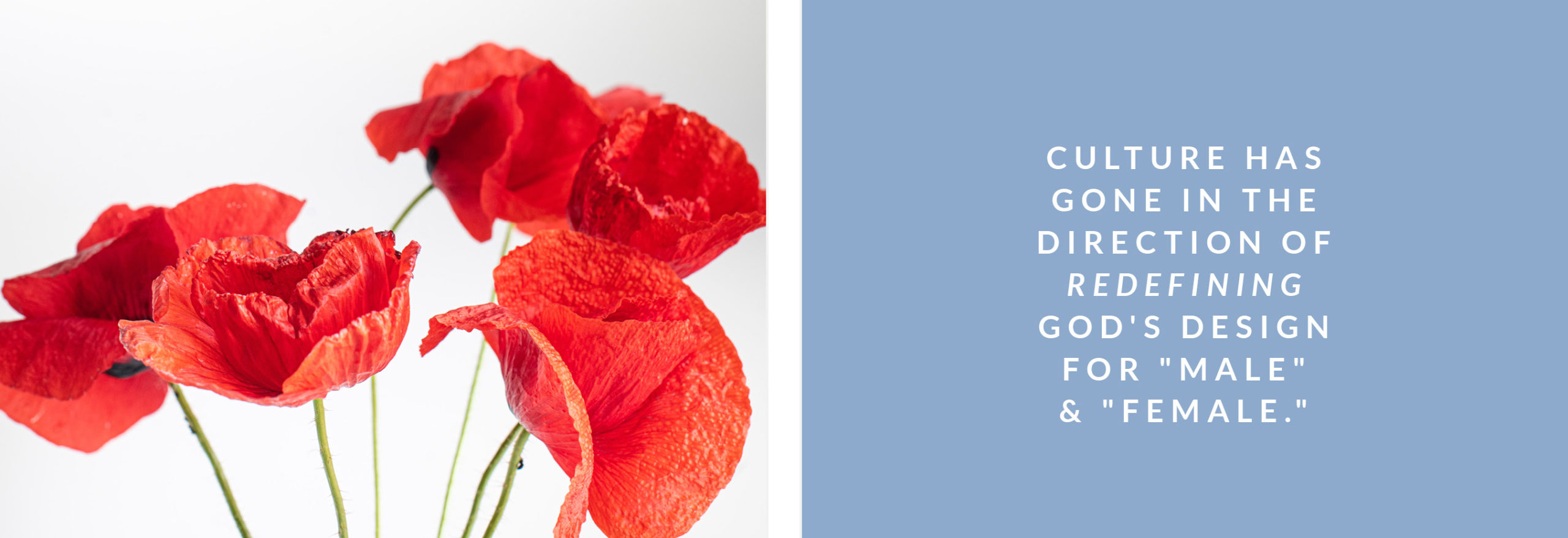
Myth No. 1:
“Maybe I was born the wrong gender.”
Our culture loudly insists that we have the right to choose which gender we want to be. If we don’t prefer the gender we were born with, we can just decide to identify with the other. I will never forget reading an article about “the man who gave birth to a baby.” It was the account of a woman who decided to become a “man” through hormonal drugs and achieved outwardly convincing results — until she wanted to have a child. Then she had to forsake the masculine qualities she had worked so hard to achieve, stop taking hormonal drugs, and allow her body to once again function as a woman’s body. Why? Because even the most advanced science cannot achieve pregnancy and childbirth in anything but the female body. Despite all her efforts to forsake her God-given femininity, she could not erase what He had designed her to be — a woman.
When we question and try to alter our God-given gender, we are, in essence, rebelling against our Creator. We are saying, “God, You got it wrong. I don’t like being a woman, I should have been born a man. I am going to try to correct the mistake that You made.”
But God doesn’t make mistakes. And rejecting our God-given gender is like spitting in His face and saying that we know better than Him. He made you and I as women on purpose. And all of His creation was very good. (See Genesis 1:31.)
…male and female, He created them.
Genesis 1:27
We will find only heartache when we rebel against God by rejecting the very design for which we were created. But there is great joy and fulfillment when we willingly accept what God has assigned and appointed us to be.
In her powerful book, Let Me Be a Woman, Elisabeth Elliot wrote,
All creatures, with two exceptions that we know of, have willingly taken the places appointed to them. The Bible speaks of angels who rebelled and therefore were cast down out of heaven, and of the fall of man. Adam and Eve were not satisfied with the place assigned. They refused the single limitation set them in the Garden of Eden and thus brought sin and death into the world… What sort of world might it have been if Eve had refused the Serpent’s offer and had said to him instead, “Let me not be like God. Let me be what I was made to be — let me be a woman”?
Let me be what I was made to be — what freedom comes when we choose to agree with that one simple idea!
If you have struggled with discontentment over your womanhood, confusion about your gender, or dissatisfaction with who God made you to be, I want to challenge you with an important question: Are you willing to trust your Creator?
God lovingly and purposefully created you as a woman. Your womanhood is not the result of random chance. It is a sacred appointment given to you as a gift by the very same Creator who formed the heavens and the earth. Are you willing to trust that the divine Hand which shaped the mountains and positioned the stars also designed you with perfect wisdom?
Even if you have never struggled with gender frustration or confusion, it is so refreshing to be reminded of this truth. Our God is wisdom itself. There is nothing in His creation that is haphazard or random — including you. He has a beautiful, purposeful design for your life. He created you as a woman, at this time in history, with your own unique qualities on purpose.
Our response to this amazing fact should not be disgruntled rebellion, but delight, worship, gratitude, and acceptance — not just with regard to our womanhood, but with regard to every other aspect of who He created us to be. Just think about this: He gave you unique physical characteristics. He gave you a certain temperament. He made you the specific nationality you are. He appointed you to live at this time in history. He allowed you to have specific strengths and specific weaknesses. He placed you in the family that He did. None of these things are mistakes on the part of our Creator. So instead of complaining about His handiwork, let’s accept it joyfully.
Let’s let God be God. He is the Creator, we are the creation. And His work is very good — always.
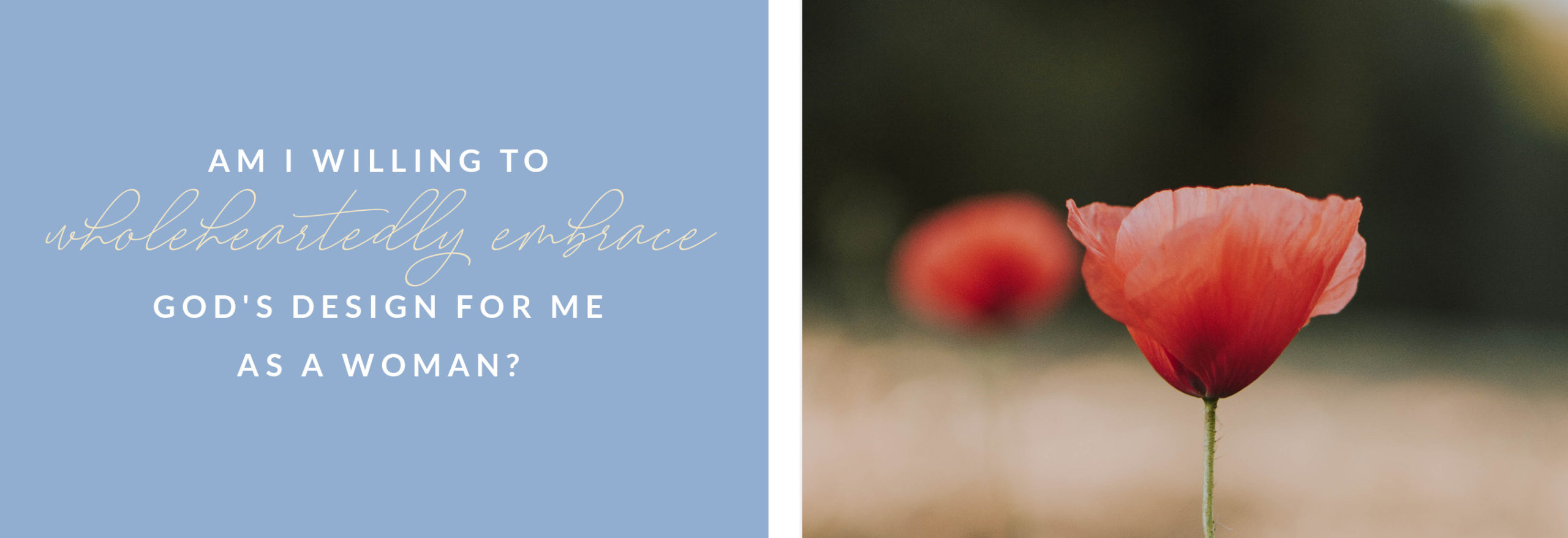
Myth No. 2
“Embracing my role as a woman
will be restrictive and oppressive.”
Having spent my entire life in Christian circles, I’ve been exposed to various ideas throughout the years of what “a woman’s role” is supposed to look like. I’ve seen the gamut of extremes: from churches where men are passive while women are the pastors and decision-makers, to churches where men are arrogantly controlling and women are treated as if their only purpose in life is to serve men. Neither attitude reflects God’s design.
There is widespread confusion about womanhood among Christians today, and that confusion has spilled over into the Church. Some Christians try to balance the culture’s ideas about female superiority by swinging the opposite direction and disregarding the value of women. Others who are motivated by social approval jump on the feminist bandwagon and disregard the value of men. And there are plenty of variations of these two extremes.
About ten years ago two books about womanhood emerged onto the Christian scene. Both became extremely popular and made strong arguments about the purpose of womanhood. These books were polar opposites in their viewpoints. The first book challenged women to embrace their God-given role as helpers to their husbands — which, of course, is based upon a biblical concept. But the writer took these principles beyond merely helping and serving to create an image of “godly womanhood” that was not only demeaning, but downright humiliating. (This was not just my own opinion as a woman — many godly men I knew were outraged by it.) The second book took a totally different vantage point, challenging women to shake off the unrealistic expectations of the Church and the culture and be whatever they wanted to be. It mocked Proverbs 31, implied that women were biblically justified in focusing on themselves, and cautioned against women serving others because it would lead to exhaustion and loss of self-expression.
It’s no wonder we are so confused about what godly womanhood really is. A lot of us shy away from fully embracing our role and calling as women because we don’t really understand God’s perspective on womanhood. We have only seen humanly-contrived ideas of what womanhood is supposed to be.
But despite the many humanly-contrived versions of “the female role” that, sadly, often creep into the Church, in reality there is nothing in God’s design for womanhood that is meant to be oppressive and miserable. Neither is there anything in God’s design that says women should take a superior position to men.
The only way to fulfill our real calling and purpose as women is to set aside human ideas and adopt God’s perspective on womanhood. God’s true purpose for womanhood may seem like a difficult vision to grasp, but Scripture is not at all silent on this issue.
Let’s take a look.
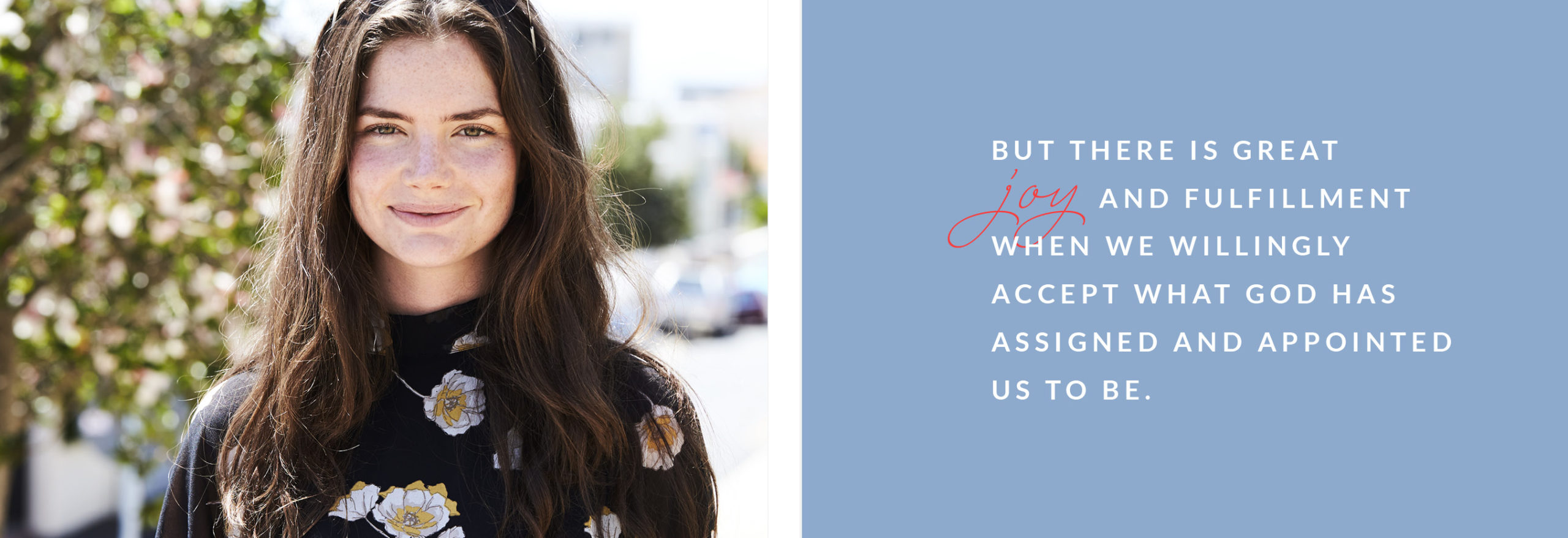
God’s Design
The Bible expresses different roles for men and women, but also makes it abundantly clear that God created men and women equally — one is not better than another. In fact, Paul says directly in Galatians 3:28 that, “There is neither … male nor female; for [we] are all one in Christ Jesus.”
We see this principle demonstrated in the life of Christ; He did not treat women as lesser than men. One of the first people to whom Jesus publicly declared Himself as the Messiah was the woman at the well. He publicly defended the woman who washed His feet with her tears, as well as Mary who poured spikenard on His head. He rescued a woman about to be stoned by a crowd of self-important men by quietly putting them all to shame. After His resurrection, Jesus appeared first to a woman and appointed her with the task of sharing the most important news that has ever existed with His disciples. From these examples, it is clear that Jesus placed a high value on women. His life continually communicated their worth and significance within His Kingdom. (And we must not forget that it is also quite clear in Scripture that men have great worth and significance to Him as well.)
What about marriage? Does God excuse men being harsh and domineering over their wives (as we see in some Christian circles today)?
The opposite is true. God commands husbands to love their wives, “as Christ also loved the church and gave Himself for her” (Eph. 5:25). There is no place in that kind of love for selfish, controlling arrogance. Men are certainly called to lead and protect, but they are never called to control or belittle. Christ’s love is outward-focused, selfless, and sacrificial. The simple fact that God goes out of His way to tell men they ought to treat their wives in this way is a clear glimpse of His great value upon women.
Of course, just as men are called to love their wives with the sacrificial love of Christ, women are also called to love and serve their husbands with the very same kind of servant-hearted love. It is not supposed to be a one-way street in either direction! Neither husbands nor wives will demonstrate this kind of love perfectly at all times — it requires the enabling grace of God and it can only flow out of a close walk with Christ. To be an excellent husband or wife, the very best thing to do is cultivate a daily, intimate walk with Him!
Note: If you find yourself in a marriage where your husband is not living out this kind of love, an article you may find helpful is The Return of Honorable Manhood, as well as my Set Apart Girl podcast episode entitled “Inspiring Men Toward Greatness.”
* And if you are in an abusive situation, I strongly encourage you to remove yourself from harm’s way and seek outside help.
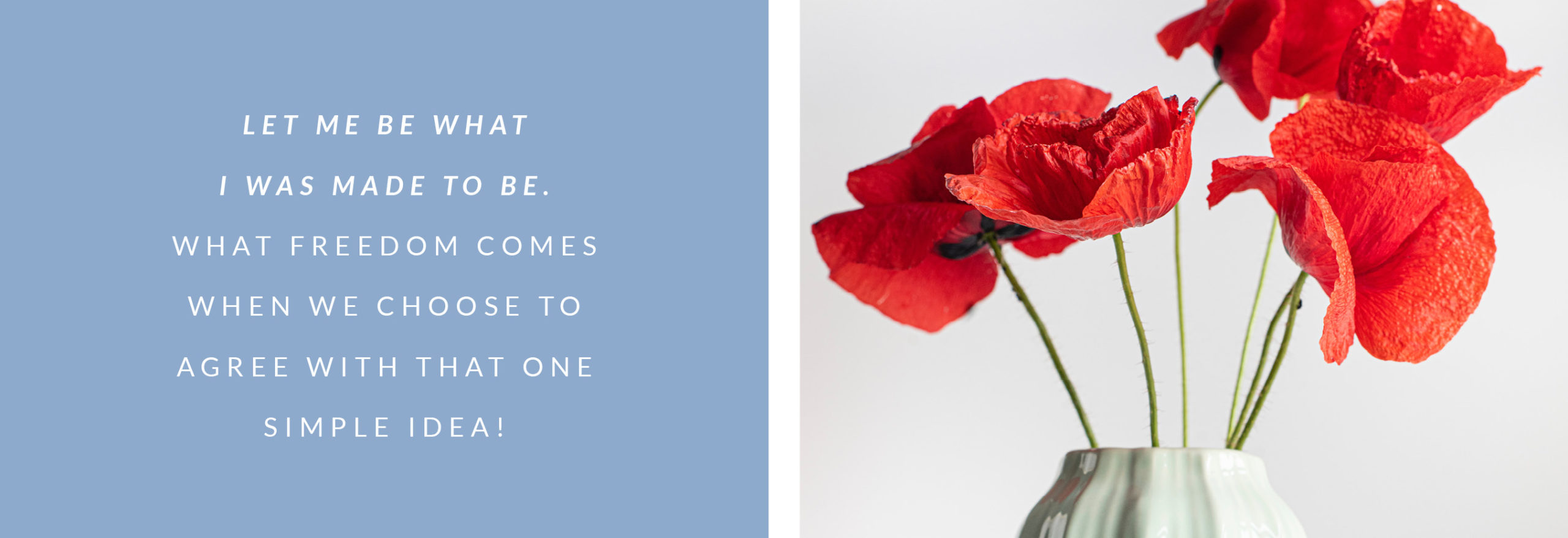
What about the common idea that godly womanhood means a weak, mousy woman whose only real purpose in life is to cook and sew? Is this a biblical notion?
There is certainly nothing wrong with cooking and sewing, but according to God’s Word there is a lot more to godly womanhood than developing domestic skills!
In fact one place in Scripture where we can catch a glimpse of God’s amazing vision for womanhood is in Proverbs 31. (Yes, I know what you might be thinking — but keep reading!) I used to shy away from this chapter, because I had been around too many Christians who used these verses to promote the idea that women were supposed to do housework all day long to the point of sheer exhaustion. But then I took a deeper look at Proverbs 31. And what I discovered both astounded and inspired me.
In Proverbs 31:10 it says, “Who can find a virtuous woman?” (KJV). The word “virtuous” often conjures up images of a timid little woman who spends her days knitting in a rocking chair. But the word “virtuous” in this context means nothing of the sort. Believe it or not, “virtuous woman” actually comes from a masculine noun that means “strength, might, valor, and power.” In other words, a “virtuous woman” is a mighty, valiant, valorous woman full of strength and conquering power. It’s the very same word that is used to describe the valiance of David when the Lord chose him to be Israel’s mighty king: “…I have seen a son of Jesse the Bethlehemite, who is … a mighty man of valor, a man of war … and the Lord is with him” (1 Sam. 16:18).
David’s mighty valor was unmatched. His power was superhuman, because it came from God. As a boy he killed lions and bears with his bare hands and single-handedly slew the greatest giant in the land. As a man, he valiantly led armies into battle and annihilated all the enemies of the Lord. It’s this very same heroic valor that marks the Proverbs 31 woman. She possesses heavenly, heroic strength that comes from God. In fact, strength is the chief quality of this woman’s life. It’s mentioned no less than three times throughout the chapter, in addition to the “virtuous, valiant” opening description.
But this kind of amazing womanly strength is very different from the modern, feministic, “lioness” type of woman who forcefully seeks to prove herself to the world. Proverbs 31 strength is not based on human ability that showcases the glory of a woman. It is based on supernatural valor that showcases the glory of God.
The godly woman in this chapter is certainly not a timid, mousy woman who sits in a corner and knits all day. But neither is she a crusader who fights for her own rights. She is busy about her Father’s business. She is a rescuer, a teacher, an influencer, and even a savvy business-woman. She is both a servant and a leader. She is respected and active in her community and in her home. She willingly pours out her life for others out of love and joy, not duty or drudgery. And though she is outward-focused, she is not bedraggled and exhausted. Her life is marked by beauty, dignity, nobility, and purpose. What a powerful and life-giving example of heroic, world-changing womanhood!
Of course, it is impossible rise up to this inspiring picture of womanhood in our own strength. (And attempting to do so will only lead to discouragement and exhaustion.) But as we yield our lives to Christ and abide in Him, He delights to build these qualities within us — not through striving, but through surrender to Him.
To understand the meaning of womanhood we have to start with God. If He is indeed ‘Creator of all things visible and invisible’ He is
certainly in charge of all things, visible and invisible, stupendous
and miniscule, magnificent and trivial.
Elisabeth Elliot
In short, embracing God’s pattern for womanhood does not lead to misery and weakness, but joy and strength — His strength. When we clear away the fog of human ideas about womanhood and grasp God’s true vision for femininity, we will gladly embrace this sacred calling upon our lives, because His ways are perfect.
So I encourage you to set aside others’ ideas of what womanhood is supposed to be, and gladly and willingly embrace God’s vision for your femininity. His plans for you are good. Remember, Jesus did not come to bring bondage and oppression, but freedom and life. It is always safe to trust the One who sacrificed everything for us.
